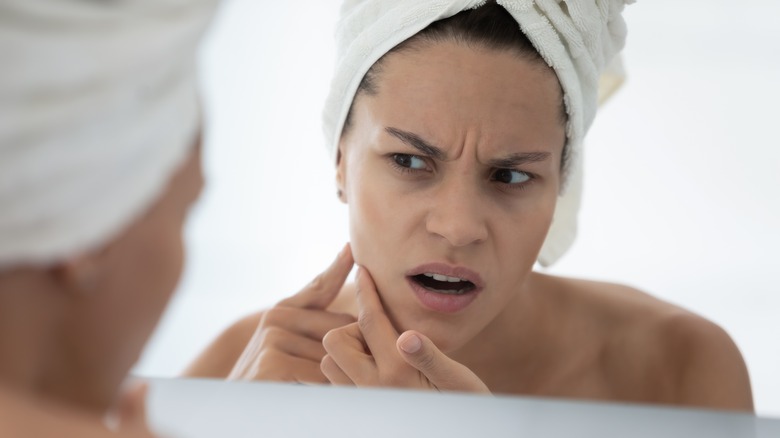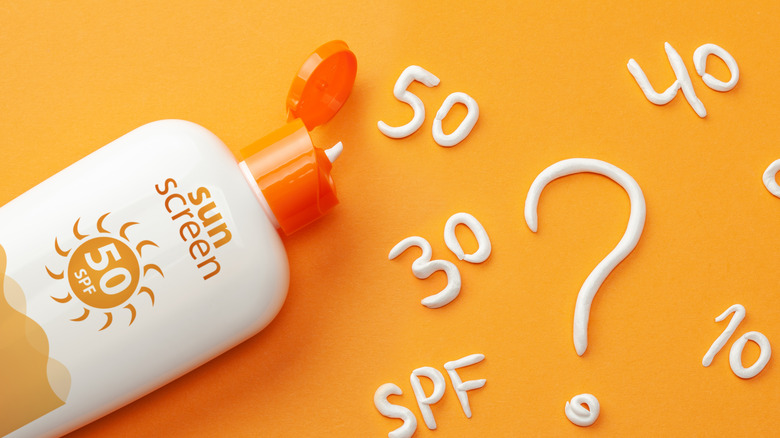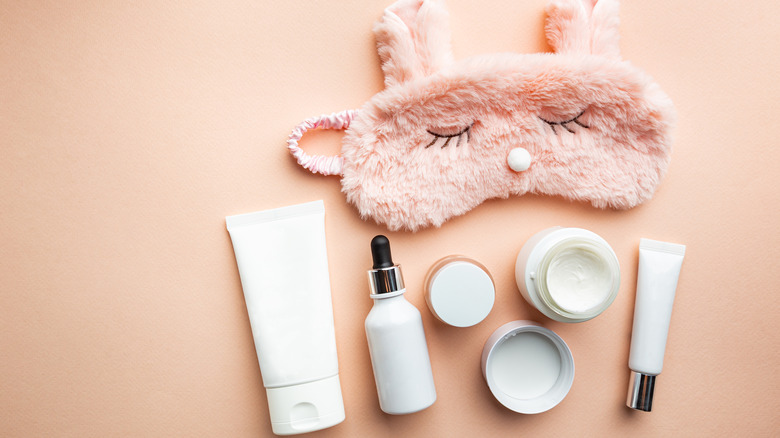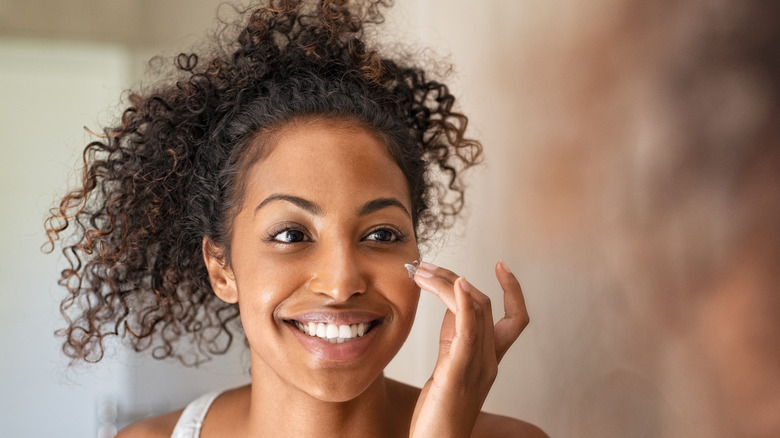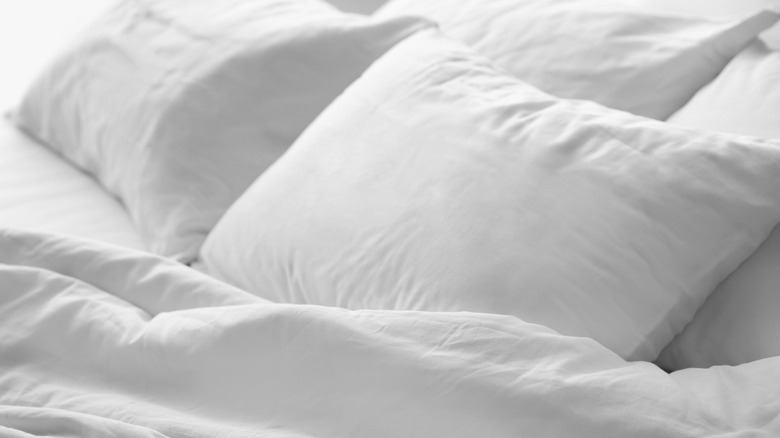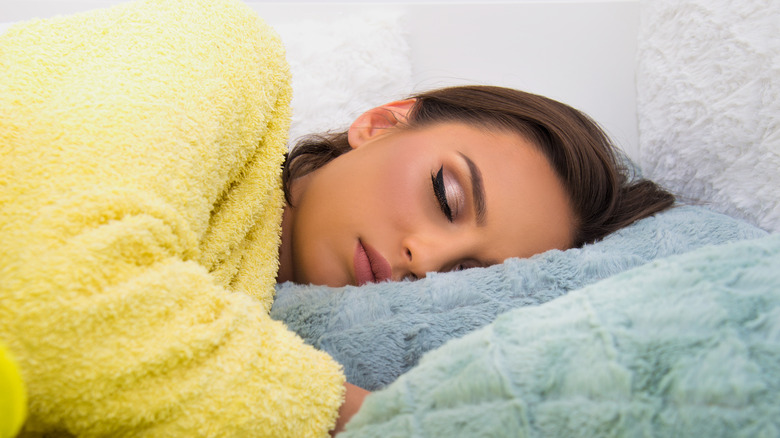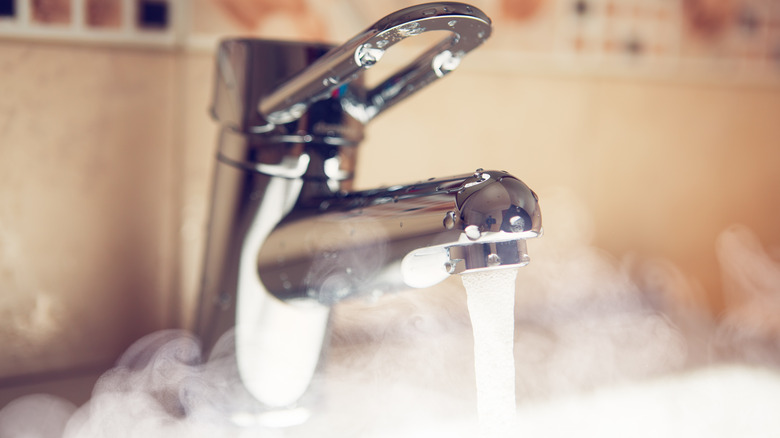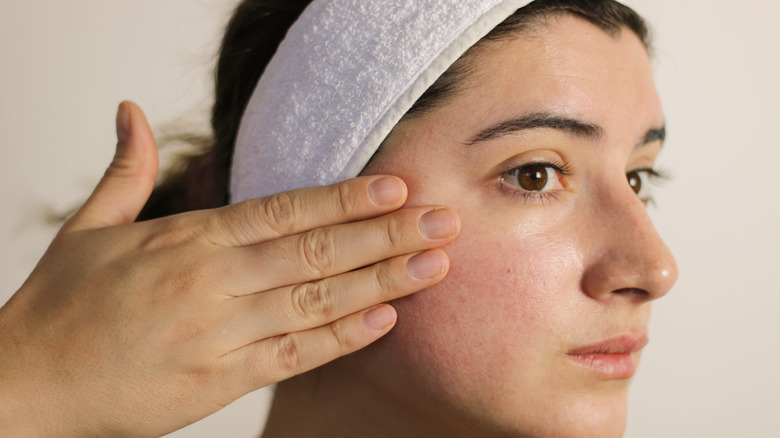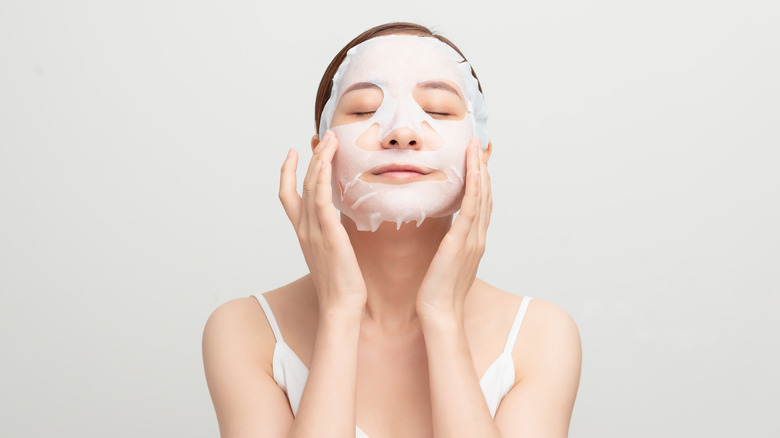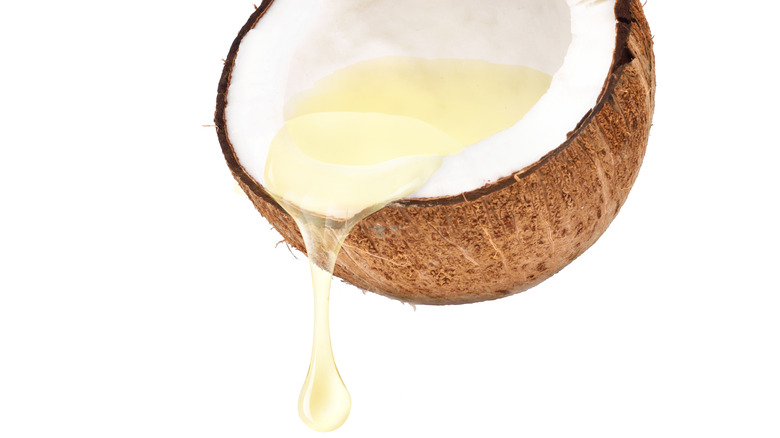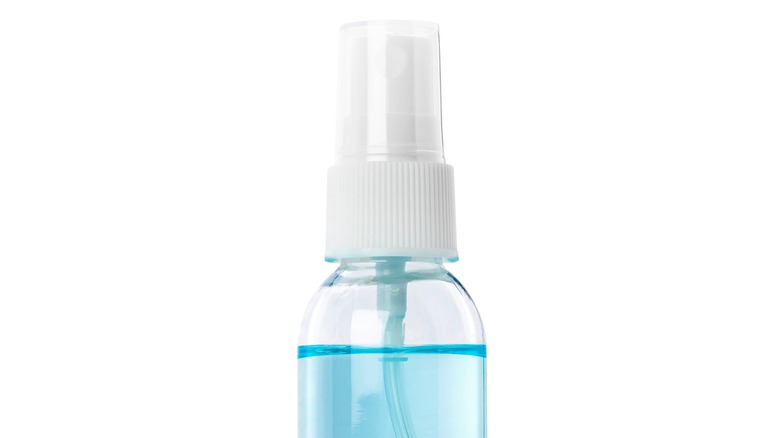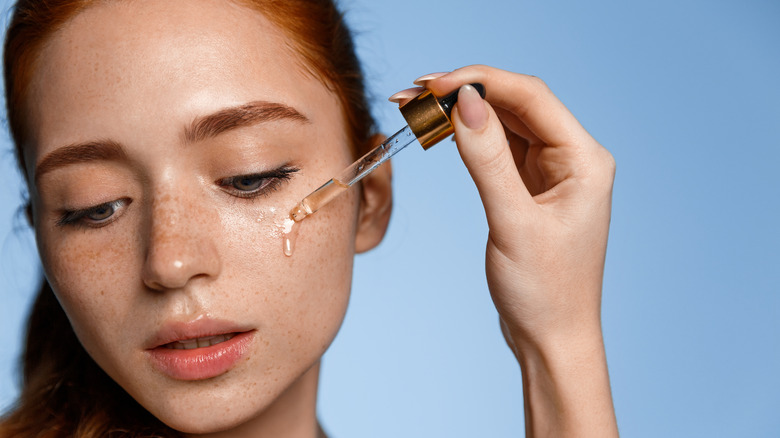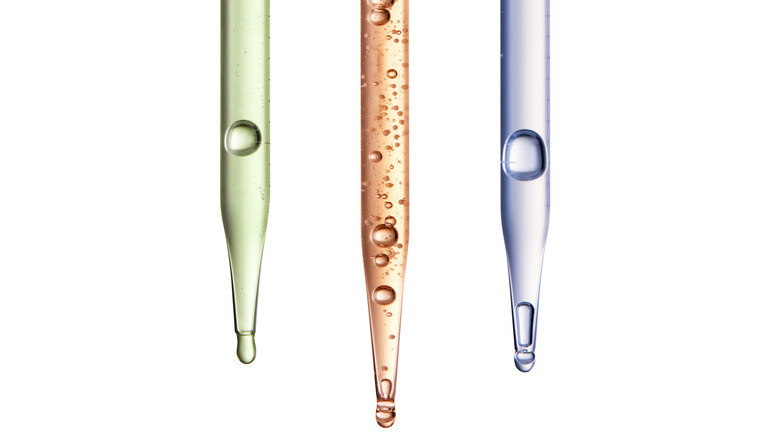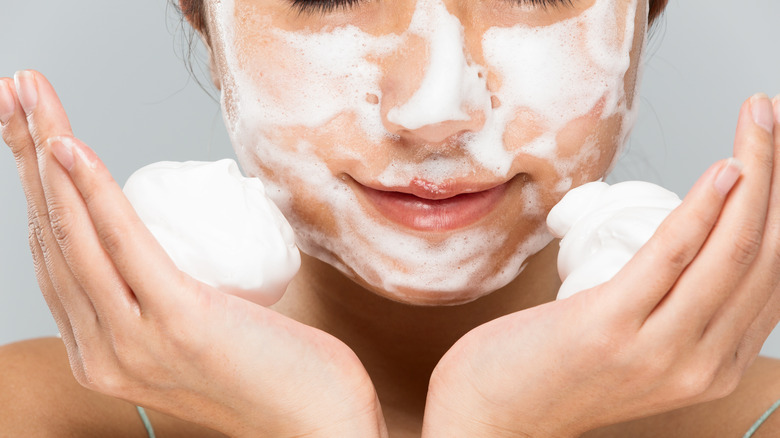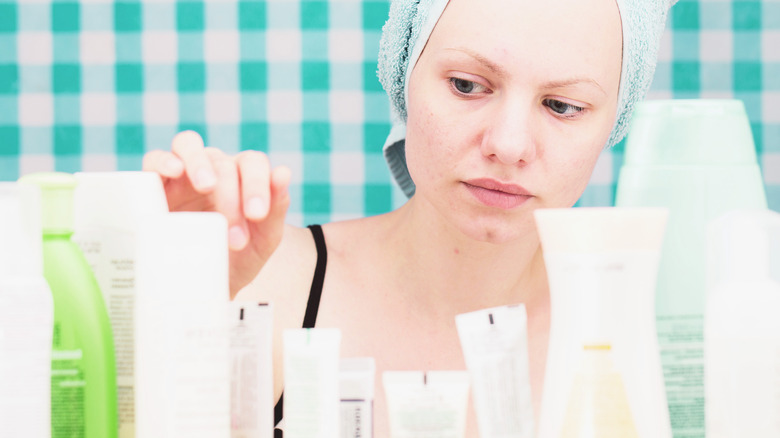The Biggest Mistakes You're Making With Skincare
Developing a skincare routine can be both an exciting and overwhelming task. With so many creams, serums, and toners on the market it can feel like a maze trying to find the products that work best for you. And making sure you're applying them in the right order and at the right time of day? Even more confusing. Furthermore, as more information is made available on how best to take care of our skin, many of the habits we learned earlier in our skincare journeys need to be refreshed.
With that said, there are also many pluses to developing a skincare routine that make it worth the investment. According to experts at Everyday Health, having a skincare routine can actually lead to improved mental health. The site explains that having a daily routine helps to provide stability during times of change, providing a source of comfort and accomplishment. When embarking on your skincare journey, you will want to make sure that whatever habits you develop are assisting you in your quest for clear and healthy skin, and not causing harm. Continue reading to learn about the most important things to avoid with your skincare routine.
Not wearing sunscreen
It's likely that you've heard this once (or a thousand times) from your dermatologist: Add sunscreen to your skincare routine. Although it may not be the "sexiest" of skincare products, the benefits of using sunscreen are innumerable according to dermatologists. According to experts at Johns Hopkins Medicine, using sunscreen is one of the best ways to take care of your skin's health, and doing so can help prevent premature aging, sunburn, and skin cancer. If you're new to the world of sunscreen, dermatologist Anna Chien spoke to the site and explained some of the basics. She says that for daily use you should wear a minimum of 30 SPF, but that if you plan to do an outdoor activity, pack on at least 60 SPF. She suggests applying at least one ounce of sunscreen, which should be enough to cover your face and neck. If you're wondering if sunscreen should come before or after moisturizer or other products, Chien says it doesn't matter as long as the sunscreen is at least 30 SPF. Unfortunately, she says that makeup with SPF won't provide enough protection unless you actually use one ounce of it (which by makeup standards is a lot), so it is best to stick with traditional sunscreen for full protection.
Using the same moisturizer day and night
If you really want to get serious about your skincare routine, it's probably time to start differentiating between your daytime and nighttime moisturizer. While you might hesitate to add the additional step, the two types of moisturizers serve very different purposes and can have a positive overall effect on your routine if used properly. Los Angeles-based dermatologist Jessica Wu spoke with Byrdie and explained that in addition to having SPF that can help protect against the sun, daytime moisturizers "... also tend to be more lightweight, so you can put makeup on without feeling greasy or looking shiny." Regarding nighttime moisturizers, Wu says these formulas are generally made to have a richer feel, and are logically sans SPF. They may also contain ingredients such as retinols, which help plump the skin, as well as glycolic acid. These two ingredients may cause skin irritation if they're exposed to the sun after they are applied, which is why they work better in nighttime formulas. "Many of my patients prefer using different products for day and night because they want the benefits of different ingredients. For example, someone might choose to use an antioxidant moisturizer in the morning and a product with retinoids at night," Wu concluded.
Not having a consistent routine
Like most things in life, developing consistency when it comes to your skincare routine will majorly contribute to your success. Whether you're a skincare rookie or have had some "skin" in the game for a while, making sure you keep up with your routine can help assure long-term success. Dr. Sandra Lee, also known as Dr. Pimple Popper, explains on her website that committing to a skincare routine is good for several reasons. The first is that you're unlikely to see results from your skincare products in a day, and committing to them for at least a month will give you a better idea of how they work. She explains that it can take upwards of a month for new skin cells to turn over, and that you should typically wait as much as four to eight weeks before deciding whether to keep or ditch a product. She goes on to say that in order to keep your skin healthy, using preventative techniques — such as consistently applying your products — is better than treating skin problems after the fact. For example, if you deal with acne, it's better to regularly use exfoliating products that help cleanse your pores rather than skimping on them and having to do damage control later.
Using a cotton pillowcase
Want to feel like a million bucks when you go to bed and do your skin a massive favor at the same time? Go ahead and treat yourself to a silk, or even a copper pillowcase. According to Healthline, while the research is still in its beginning stages, a recent study sponsored by Wake Forest University showed that people who slept on "silk-like" pillow cases actually had a reduction in acne compared to those who slept on cotton pillow cases. Experts at Healthline explain that the benefits of sleeping on a silk pillowcase include creating less friction on the skin, providing a cleaner surface for sleeping, as well as being less drying for the skin. Yoram Harth, a board-certified dermatologist and the medical director of MDacne, spoke to the website and explained why this is: "Silk pillowcases absorb less of the moisture and dirt and thus may be a better choice for people with acne. This is especially true for people who sleep on their sides or stomach," he explained. Regarding copper pillowcases, experts at Healthline say the copper oxide particles embedded in the pillowcase have antimicrobial benefits for the skin, and may even contribute to the reduction of fine lines and wrinkles.
Going to sleep in your makeup
This may be an old one, but it's certainly a goodie. While it may seem innocuous, going to sleep in your makeup actually has some pretty serious side effects including premature aging. Dr. Sue Ann Wee of Schweiger Dermatology Group in NYC spoke to Byrdie and outlined exactly what happens when washing your face before bed conveniently slips your mind. Wee starts by explaining that, "First, makeup can trap dirt and environmental pollutants inside the skin, and this type of environmental stress can result in increased free radicals which can cause DNA mutations, collagen degradation, and, over time, can result in premature aging." Next up, acne is likely to make an appearance. Because makeup can contain pore-clogging ingredients, leaving it on overnight can lead to congested skin, and thus acne. Wee also mentions the possibility of a "duller, dry, and coarse" complexion because sleeping in makeup long-term can prevent the "natural shedding or exfoliation process of the skin." Itchy and inflamed eyes are another unfortunate side effect of wearing makeup to bed, as some of the ingredients from mascara or other eye makeup can migrate into the eyes, causing irritation and potential infection.
Washing your face with extreme temperatures
Hot, cold, or somewhere in between? You may not have given serious thought to how the temperature of your water could affect the quality of your skin, but there is a link between the two, so get your pen and paper ready and take some notes. Starting with cold water, experts at Healthline explain that while, yes, there are some benefits to washing with it, including helping to regulate oil levels, there are also drawbacks that might make you want to reconsider using it. Sophia Knapp, a licensed cosmetologist at the skin care and cosmetics line Oxygenetix, spoke to the site and explained, "Since cold water tightens your pores, bacteria and debris can get trapped and won't clear out as easily as [when you use] warm water." Instead, Knapp suggests washing your face with lukewarm water to loosen up the day's debris, and to "Then, end with a cold water rinse to tighten pores and promote blood circulation for a healthy glow." Furthermore, experts at the site explain that most skincare products were actually designed to work best with lukewarm water. As for hot water, if you have dry skin, the high temperatures can strip your skin of its oils and make matters worse. At the end of the day, experts suggest finding a happy medium between hot and cold with lukewarm water.
Over-exfoliating
Many elements of skincare have become quite buzzworthy and popular, and it's easy to get excited and perhaps go a little, well, overboard. Elements like exfoliation require a delicate balance in your routine because of their harshness, and it's important to know exactly when to back off so as not to cause harm. Starting off with the benefits of exfoliation, New York City board-certified dermatologist Shari Marchbein spoke to Allure and explained, "Exfoliation, whether chemical or physical, is an important part of a skin-care routine because it helps maintain a dewy, hydrated glow, can even skin tone and texture, and can unclog pores." But going at it too hard can lead to serious damage according to other experts. Boston board-certified dermatologist Ranella Hirsch spoke to the magazine in a previous article and explained, "For some reason, people think exfoliating means 'torture my skin like it has secret government information.' Over-exfoliating is probably the single most significant cause of breakouts." The site explains that exfoliation should be limited to three times a week at most, because any more than that can actually lead to cracks in the skin that can cause inflammation and dryness.
Wearing your sheet mask too long
The scene is set: You come home after a long day, prepare yourself dinner, wash your face, and pop on a sheet mask before sitting down to binge watch the latest Netflix series. Enthralled in all the drama, you soon realize two hours have passed and your sheet mask has all but hardened in place. Whoops. You take it off, but unfortunately, your skin has already suffered the consequences. But why, you ask? Dermatologist Shari Marchbein spoke to Allure to provide some answers: "Letting a sheet mask dry on your face, or even just leaving the mask on longer than recommended, can allow even seemingly innocuous ingredients to dry and irritate the skin, which is the exact opposite of its intended purpose," she explained. Experts at the site note that your skin can only absorb so much moisture from the mask, and after it's completed that task, the mask will actually start to draw away moisture from your skin and dry it out. Experts recommend following the instructions and leaving the sheet mask on for 20 minutes at most.
Using pore-clogging ingredients
It's easy to understand: The list of ingredients on the back of your favorite skincare products can be overwhelming. There are lots of letters, lots of syllables, and you probably weren't paying attention during that science class. But if you're going to pick a reason to learn how to read the labels, this one is as good as any. Pore-clogging ingredients, also known as comedogenic ingredients, can lead to an accumulation of debris that clogs hair follicles and pores, leading to acne, according to Medical News Today. While our skin's natural oils and dead skin can cause blocked pores, certain ingredients in products can also contribute. Some comedogenic ingredients you might find on skincare labels include isopropyl palmitate, isopropyl isostearate, and butyl stearate, but there are some natural ingredients you may want to be aware of as well. Coconut oil, for example, is highly comedogenic and can worsen symptoms of acne, according to Healthline. Cocoa butter is another ingredient that is high in comedones, according to Healthline, and should be avoided in skincare routines. If you want to add oils into your routine, use noncomedogenic options such as soybean oil, sunflower oil, and safflower oil.
Overusing alcohol
Alcohol in skincare can be appealing to those who deal with oily, acne-prone skin, as it easily dissolves oil and can leave skin feeling clean and fresh. While that feeling may leave you on a temporary skincare high, its not likely to last long, as alcohol can leave your skin stripped and dry down the road, according to experts who spoke to Byrdie. However, before all alcohols are given a bad rap, experts explain there are actually a few that serve a positive purpose. Oculoplastic surgeon Maryam Zamani spoke to the site and explained, "Fatty alcohol, which is derived from coconut or palm oil, is sometimes used to thicken a formulation and can be nourishing for the skin." The types of alcohols that can be beneficial to your routine include cetyl, stearyl, and cetearyl, as they can help the absorption of other ingredients in your product. Alcohols to stay away from include SD alcohol 40, denatured alcohol, ethanol, and isopropyl alcohol, as they dry out the skin. Celebrity esthetician Renée Rouleau explained to the site that the use of these types of alcohols can actually lead to enlarged pores, irritate your skin, and make it even more oily.
Applying essential oils directly to your skin
Essential oils serve many positive purposes including enhancing your mood, helping with inflammation, and even fighting infection (via Cleveland Clinic). With so many on the market it can be really easy to incorporate them into your daily routine, but it's important to know how to properly use them to prevent harm. Skincare experts at Allure provided the lowdown on how best to incorporate essential oils into your skincare routine, and which ones to avoid altogether.
As far as which ones could work best for your skin, Sejal Shah, dermatologist and founder of SmarterSkin Dermatology in New York City, explained that lavender, chamomile, sandalwood, and rosehip seed oil are excellent ones to add into your rotation. Before you grab your bottle, dermatologist Joshua Zeichner suggests diluting them with a carrier oil first: "If you're going to apply it topically to the skin, the essential oil should be diluted in what's known as a carrier oil, such as coconut oil [or argan], because applying the essential oil in its concentrated form to the skin can cause significant irritation," he explained to Allure. Furthermore, diluting the oil with a vegetable oil can actually provide more benefits to the skin due to the positive qualities of the vegetable oil, Zeichner explained.
Using products with synthetic fragrance
While a nice fragrant aroma can be a calming addition to your skincare routine, the effect that fragrance has on your skin may not be as soothing, according to skincare experts. Dr. Parisha Acharya, aesthetic doctor at Waterhouse Young, spoke to Refinery 29 and explained, "Those with sensitive or acne-prone skin types and chronic skin conditions, such as eczema, should try to avoid fragranced skin care, as it may further irritate their delicate skin." While experts at the site explain that not all fragrance is bad for the skin, there are some common allergens in fragrances such as cinnamal, isoeugenol, limonene, and linalool. For those who have sensitive skin, fragrance can cause what is called irritant contact dermatitis. This occurs when the fragrance interacts with the top layer of the skin, creating irritation, cracks, and leaving it vulnerable to infection. Another reaction may be allergic contact dermatitis, which is what happens when the body recognizes the fragrance as a foreign object and the immune system reacts accordingly via inflammation.
Using sulfates on sensitive skin
On the topic of sensitive skin, it's important for those whose skin may not be as "hardy" as others' to know what types of skincare products to use and which to avoid. Sulfates have been at the center of debate for a while regarding whether they are safe to use, or even necessary, according to Healthline. Sulfates are defined as a salt that is created from the interaction of sulfuric acid and another chemical. The most common sulfates found in beauty products are sodium lauryl sulfate and sodium laureth sulfate, and are typically derived from petroleum, or either palm or coconut oil. According to experts at Healthline, the dangers of using sulfates include skin, lung, and eye irritation. Another potential side effect for those with sensitive skin is that sulfates can clog the pores, which could potentially lead to breakouts. If you want to make the switch to sulfate-free cleansers, the site suggests either buying products that specifically label themselves as such, or avoiding products with the aforementioned ingredients on the label. Products such as African black soap or cleansing oils are sulfate-free — and while these products don't create the foamy lather that you might be accustomed to, keep in mind that the lather produced from sulfates is not necessary to get clean.
Using too many products
So you've decided it's finally time to get your skin on the track to great health. You've read all the articles (including this one), and have your reusable bags ready and waiting to be filled with all the latest skincare releases. Before you head out the door, one last word of wisdom from the skincare experts: Don't overdo it. It's natural to want to try a lot of products, but according to Abi Cleeve, skin expert and founder of skinSense and Ultrasun, it's just not necessary. "You don't need five products in the morning and five in the evening. A good skincare routine is about targeted products that really deliver, because our skin doesn't like being overstressed. Firstly, it's not comfortable to have layer after layer of product and essentially, it's just a waste," she said, speaking to Refinery 29. Some symptoms of skincare overload include sticky or oily skin from products that just sit on the surface, or on the other hand, skin that is irritated, dry, or red. You may also experience breakouts resulting from blocked pores, or even a rash caused by combining ingredients that don't mix.

